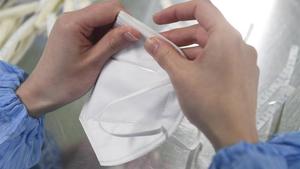Editor's note: This news column showcases stories from around the world that bring a touch of positivity to the fight against the deadly coronavirus.
 A worker produces medical N95 masks at a mask production company in Southwest China's Chongqing, Feb 17, 2020. (PHOTO / XINHUA)
A worker produces medical N95 masks at a mask production company in Southwest China's Chongqing, Feb 17, 2020. (PHOTO / XINHUA)
Sourcing medical masks, keeping up with COVID-19 news and checking in on his doctor son have become the "new normal" for Zhiyu Jiang, a tech entrepreneur in Silicon Valley.
As CEO of Virtual Enterprise System Solutions, a San Jose-based company, Jiang has been shifting the company's focus to providing COVID-19 solutions through analyzing big data.
Jiang is also the proud father of a son who graduated from the University of California, San Diego, with a medical degree and now works as a senior resident at Northwestern Memorial Hospital in Chicago.
"I'll just do whatever I can think of to be his backup," said the elder Jiang.
The pandemic disrupted a family reunion in March as the son and his girlfriend, also a doctor at the same hospital, had to cancel their planned trip to visit because of the worsening outbreak across the United States.
We studied the best practices by China and South Korea, and we have provided our strategies of testing, tracing and treatment to reopen the retail sector to the office of the Nevada governor.
Zhiyu Jiang, CEO of Virtual Enterprise System Solutions, US
Since then, Jiang has been checking on them through group text messages. "Everything's fine" is the best message he's gotten back from them.
"I know he must be stressed out, working 90 to 100 hours a week in an ICU unit," said Jiang. But what worries the father most is the shortage of personal protective equipment, or PPE, faced by almost all medical workers in the country.
ALSO READ: Chinese-American teenagers make face shields with 3D printing tech
"His unit has no N95 masks, only surgical masks. I heard the hospital had only one week's supply of masks in early March," Jiang recalled. "They were caught off guard, but luckily the curve (of the coronavirus) in Chicago is not that sharp."
His son's unit is not designated for COVID-19 patients but works in the same building housing them, which was enough for Jiang to marshal his resources in China to source PPE.
Jiang secured a first batch of 100 N95 masks and 300 surgical masks from a friend in Beijing and sent them to his son. However, his son felt "peer pressure" to not wear N95 masks at work because his colleagues didn't have any.
Then Jiang began sourcing more N95 masks and other PPE so his son could share them with his team.
Father's efforts
"It's a very difficult task," said Jiang. He has spent much time studying PPE, comparing the products from different manufacturers and trying to find the best quality and most effective shipping methods.
He has sent more than 1,000 N95 masks and other protective gear, including isolation gowns and face shields, to his son.
It has recently become more difficult to procure medical-grade PPE. But for non medical-grade masks, the process is easier. He recently received 1,000 disposable masks produced by a clothing factory in Shaoxing, Zhejiang province. The material is the same as for the medical masks, only non-sterile, he said.
READ MORE: Energy giants ramp up raw material supplies for protective gear
Jiang said he would share those masks with his company's employees, relatives and friends because face coverings will be more widely required at retailers in California as the state gradually eases stay-at-home orders.
His company's automated decision-support system is expected to help counties and states make better-informed decisions as they seek to reopen, Jiang said.
"We studied the best practices by China and South Korea, and we have provided our strategies of testing, tracing and treatment to reopen the retail sector to the office of the Nevada governor," he said.
He also collaborated with the University of San Francisco to give an MBA seminar on optimizing PPE demand and supply through big data for managers from biopharmaceutical companies in the Bay Area.
"The seminar proved successful. They were very interested in China's practices, especially the incorporation of traditional Chinese medicine in the COVID-19 treatment," Jiang said.


